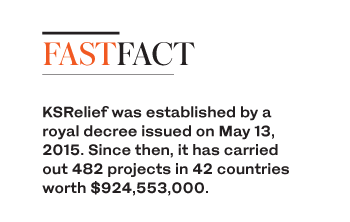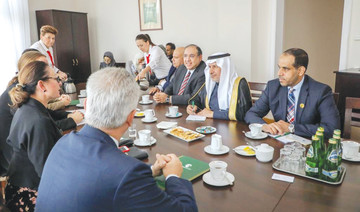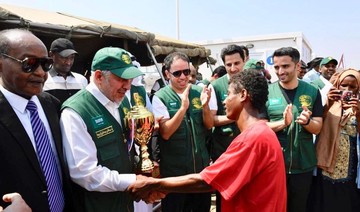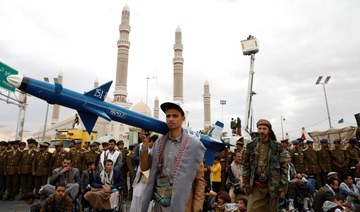JEDDAH: Saudi Arabia has given $84.7 billion in foreign aid to 79 countries between 1996-2018, according to Dr. Abdullah Al-Rabeeah, general supervisor of the King Salman Humanitarian Aid and Relief Center (KSRelief).
Al-Rabeeah highlighted Saudi Arabia’s contributions to international humanitarian and relief work, and said that the Kingdom had saved millions of people from conflicts and crises, regardless of their religion or ethnicity.
Al-Rabeeah was speaking during a seminar on the Kingdom’s humanitarian efforts at the University of Warsaw on Saturday, in the presence of Saudi Ambassador to Poland Mohammed Madani, Ambassador of Yemen to Poland Mervat Majali, and officials of the Foreign Ministry of Poland.
The royal decree establishing KSRelief was issued on May 13, 2015. Since then, it has carried out 482 projects in 42 countries worth $924,553,000. About 86 percent of the projects have been allocated to Yemen with a value of $659,271,000.
Al-Rabeeah said that the center implemented 206 projects for women worth $341,481,000, as well as 171 projects for children worth $504,962,000.
He added that the Kingdom had taken in 561,911 Yemeni refugees, 283,449 Syrian refugees and 249,669 refugees from Myanmar, the equivalent of 5.36 percent of the population of Saudi Arabia, putting it in second place internationally in terms of the number of refugees accepted.
Al-Rabeeah said that total Saudi assistance to Yemen since 2015 had reached $11.18 billion, noting that KSRelief has carried out 294 projects in Yemen in partnership with 80 UN and international and local NGOs.
Al-Rabeeah said that the response of KSRelief to the appeal by the World Health Organization (WHO) and UNICEF for $66.7 million to combat the cholera epidemic in Yemen, as well as the projects allocated by KSRelief for women in Yemen from 2015 to date, amounted to 132 projects valued at $281,457,000. There have been 136 projects for children worth $469,867,000.
He highlighted that the Saudi project for mine clearance in Yemen, “Masam,” had been conducted by more than 400 people working in 32 teams within Yemeni territory during the preparation phase, and five specialized teams for rapid intervention, benefiting 9 million beneficiaries.
The costs of the project amounted to $40 million in the governorates of Marib, Aden, Taiz and Sanaa. More than 1 million land mines had been planted in Yemen, more than the number planted in World War II, he said.
Al-Rabeeah said that KSRelief was running a program to rehabilitate Yemeni children recruited by the Houthi militias, who use them as human shields. KSRelief is rehabilitating and providing care for 2,000 children through social, psychological, cultural and sports programs.
KSA grants $84.7bn in aid to 79 countries: KSRelief chief
KSA grants $84.7bn in aid to 79 countries: KSRelief chief

- Al-Rabeeah said that KSRelief was running a program to rehabilitate Yemeni children recruited by the Houthi militias
Biden signs ban on imports of Russian nuclear reactor fuel into law

- Russia is the world’s top supplier of enriched uranium, and about 24 percent of the enriched uranium used by US nuclear power plants come from the country
WASHINGTON: President Joe Biden signed a ban on Russian enriched uranium into law on Monday, the White House said, in the latest effort by Washington to disrupt President Vladimir Putin’s invasion of Ukraine.
The ban on imports of the fuel for nuclear power plants begins in about 90 days, although it allows the Department of Energy to issue waivers in case of supply concerns.
Russia is the world’s top supplier of enriched uranium, and about 24 percent of the enriched uranium used by US nuclear power plants come from the country.
The law also unlocks about $2.7 billion in funding in previous legislation to build out the US uranium fuel industry.
“Today, President Biden signed into law a historic series of actions that will strengthen our nation’s energy and economic security by reducing, and ultimately eliminating, our reliance on Russia for civilian nuclear power,” Jake Sullivan, the national security adviser, said in a statement.
Sullivan said the law “delivers on multilateral goals we have set with our allies and partners,” including a pledge last December with Canada, France, Japan and the United Kingdom to collectively invest $4.2 billion to expand enrichment and conversion capacity of uranium.
The waivers, if implemented by the Energy Department, allow all the Russian uranium imports the US normally imports through 2027.
US calls on Iran to halt ‘unprecedented’ weapons transfers to Yemen’s Houthis for attacks on ships

- The Houthis have launched more than 50 attacks on shipping, seized one vessel and sunk another since November, the US Maritime Administration said late last month
UNITED NATIONS: The United States called on Iran on Monday to halt its transfer of an “unprecedented” amount of weaponry to Yemen’s Houthi rebels, enabling its fighters to carry out “reckless attacks” on ships in the Red Sea and elsewhere.
US deputy ambassador Robert Wood told the UN Security Council that if it wants to make progress toward ending the civil war in Yemen it must act collectively to “call Iran out for its destabilizing role and insist that it cannot hide behind the Houthis.”
He said there is extensive evidence that Iran is providing advanced weapons, including ballistic and cruise missiles, to the Houthis in violation of UN sanctions.
“To underscore the council’s concern regarding the ongoing violations of the arms embargo, we must do more to strengthen enforcement and deter sanctions violators,” Wood said.
The Houthis say their attacks on shipping in the Red Sea and Gulf of Aden are aimed at pressuring Israel to end its war with Hamas in Gaza, which has killed more than 35,000 Palestinians there. The war began after Hamas-led militants attacked Israel on Oct. 7, killing 1,200 people and taking some 250 others hostage.
The Houthis have launched more than 50 attacks on shipping, seized one vessel and sunk another since November, the US Maritime Administration said late last month.
Houthi attacks have dropped in recent weeks as the rebels have been targeted by a US-led airstrike campaign in Yemen. Shipping through the Red Sea and Gulf of Aden has declined because of the threat.
But Hans Grundberg, the UN special envoy for Yemen, warned the council that “hostilities continue” even though there has been a reduction in attacks on commercial and military vessels in the Red Sea, Gulf of Aden and the Indian Ocean as well as a reduction in the number of US and British airstrikes on targets in Yemen.
He pointed to an announcement by the Houthis that they will “expand the scope of attacks,” calling this “a worrisome provocation in an already volatile situation.”
Russian Ambassador Vassily Nebenzia told the council that the Israeli announcement on May 6 that it was starting its military operation in Gaza’s southern city of Rafah, where 1.2 million Palestinians had sought safety, ratcheted up the spiral of escalation in the region “another notch further.”
“There’s no doubt that this will have an impact on the situation in Yemen’s surrounding waters,” he said, noting the Houthis’ opposition to Israeli attacks that harm Palestinian civilians.
But, Nebenzia added, “We call for a swift cessation of the shelling of commercial vessels and any other actions that hamper maritime navigation.”
He sharply criticized the United States and its Western allies, saying their “totally unjustified aggressive strikes” in Yemen violate the UN Charter. He said they further complicate an already complex situation and won’t improve the situation in the Red Sea.
The war between the Houthis and pro-government forces in Yemen backed by a coalition of Gulf Arab states has raged since 2014. The Houthis swept down from the mountains, seized much of northern Yemen and the country’s capital, Sanaa, and forced the internationally recognized government to flee into exile to Saudi Arabia. Since then, more than 150,000 people have been killed by the violence and 3 million have been displaced.
Fighting has decreased markedly in Yemen since a truce in April 2022, but there are still hotspots in the country
Grundberg recalled that in December the Houthis and the government “took a courageous step toward a peaceful solution” by agreeing to a series of commitments that would provide for a nationwide ceasefire, ensure desperately needed humanitarian aid, and initiate a political process to end the conflict.
But UN humanitarian chief Martin Griffiths reported “alarmingly high” levels of severe food deprivation across the country that are expected to worsen during the lean season for crops starting in June.
Griffiths also expressed serious concern about a rapidly worsening cholera outbreak. He cited reports of 40,000 suspected cholera cases and over 160 deaths — “a sharp increase” since last month, the majority in Houthi-controlled areas “where hundreds of new cases are reported every day.”
Middle East poultry exhibition in Riyadh focuses on value engineering

- The conference seeks to enhance the use of modern technologies, through the showcasing of more than 800 supply chain products by the sector’s leading companies
RIYADH: Experts in the poultry industry gathered in the Saudi capital to share knowledge on ways to enhance business value in the sector.
The Middle East Poultry Exhibition, an annual event in its third year, is running until May 15 and expected to attract thousands of visitors.
Abdulrahman Al-Fadhli, the minister of environment, water and agriculture, opened the conference being held at the Riyadh International Convention and Exhibition Center on Monday.
The three-day event includes more than 100 experts in the poultry, fodder, and animal nutrition sectors, and about 300 companies from 40 countries around the world.
The exhibition is being held under the slogan “Maximizing value and reducing costs: Value engineering in the poultry industry.”
The conference seeks to enhance the use of modern technologies, through the showcasing of more than 800 supply chain products by the sector’s leading companies.
The meeting offers opportunities for the exchange of experiences and practices in the sector and other related industries, and the review of investment opportunities to contribute to GDP, and in an effort to achieve the goals of the National Food Security Strategy, the Saudi Press Agency reported.
“The total amount of support provided to the poultry sector through the agricultural subsidies program amounted to more than SR665 million”, according to the Al-Fadhli’s ministry, the expo said.
The Kingdom aims to achieve a poultry meat self-sufficiency rate of 80 percent by 2025, according to the SPA.
The sector is one of the fastest growing in the Kingdom, due to support through government facilities for poultry projects, and increased private sector investment.
Tunisian police storm lawyers’ headquarters and arrest another lawyer

- Dozens of lawyers including Zagrouba gathered earlier on Monday in front of the courtroom, chanting slogans including: “What a shame, the lawyers and the judiciary are under siege”
TUNIS: Tunisian police stormed the bar association’s headquarters for the second time in two days and arrested a lawyer, witnesses said on Monday, after detaining two journalists as well as another lawyer critical of the president over the weekend.
A live broadcast on media website TUNMEDIA showed videos of broken glass doors and toppled chairs while the police arrested the lawyer Mahdi Zagrouba and other lawyers screamed in the background. Zagrouba is a prominent lawyer known for his opposition to President Kais Saied.
On Saturday, police stormed the building of the Tunisian Order of Lawyers and arrested Sonia Dahmani, a lawyer also known for her fierce criticism of Saied.
Dahmani had said on a television program last week that Tunisia was a country where life was not pleasant. She was commenting on a speech by Saied, who said there was a conspiracy to push thousands of undocumented migrants from Sub-Saharan countries to stay in Tunisia.
Some opposition parties described the storming of the lawyers’ building on the weekend as “a shock and major escalation,” and the bar association declared a nationwide strike.
Dozens of lawyers including Zagrouba gathered earlier on Monday in front of the courtroom, chanting slogans including: “What a shame, the lawyers and the judiciary are under siege.”
The Interior Ministry said in a statement that “the judicial decision against Zagrouba was due to his physical and verbal assault on two policemen today near the courtroom.”
Tunisia’s public prosecutor on Monday extended the detention of two journalists, Mourad Zghidi and Borhen Bsaiss, who were also on arrested on Saturday over radio comments and social media posts in a separate incident.
“It’s a horror scene... police entered in a showy manner and arrested Zagrouba and dragged him to the ground before some of them returned to smash the door glass,” said lawyer Kalthoum Kanou who was at the scene.
Saied took office following free elections in 2019, but two years later seized additional powers when he shut down the elected parliament and moved to rule by decree.
He also assumed authority over the judiciary, a step that the opposition called a coup.
Top Biden official doubts Israel can achieve ‘total victory’ in Gaza

- Israel has killed more than 35,000 Palestinians, according to Gaza’s Health Ministry
WASHINGTON: The Biden administration does not see it likely or possible that Israel will achieve “total victory” in defeating Hamas in the Palestinian enclave of Gaza, US Deputy Secretary of State Kurt Campbell said on Monday.
While US officials have urged Israel to help devise a clear plan for the governance post-war Gaza, Campbell’s comments are the clearest to date from a top US official effectively admitting that Israel’s current military strategy won’t bring the result that it is aiming for.
“In some respects, we are struggling over what the theory of victory is,” Campbell said at a NATO Youth Summit in Miami. “Sometimes when we listen closely to Israeli leaders, they talk about mostly the idea of....a sweeping victory on the battlefield, total victory,” he said.
“I don’t think we believe that that is likely or possible and that this looks a lot like situations that we found ourselves in after 9/11, where, after civilian populations had been moved and lots of violence that...the insurrections continue.”
Israeli Prime Minister Benjamin Netanyahu has repeatedly vowed to achieve “total victory” against Hamas, the Palestinian militant group that attacked Israel on Oct. 7 and killed 1,200 people and took 250 others hostage.
In response, Israel unleashed a relentless assault on the Gaza Strip, killing more than 35,000 people, according to the figures of the Gazan health ministry, and reducing the densely populated tiny enclave to a wasteland.
Campbell’s comments come as Washington is warning Israel not to go ahead with a major military offensive in Rafah, the southernmost city of the Gaza Strip where over a million people who have already been displaced by Israeli attacks are taking shelter.
Likening the situation in Gaza to that of a recurring insurgency that the United States faced in Afghanistan and Iraq after its invasions there following the Sept. 11 attacks, Campbell said a political solution was required.
“I think we view that there has to be more of a political solution...What’s different from the past in that sense, many countries want to move toward a political solution in which the rights of Palestinians are more respected,” he said.
“I don’t think it’s ever been more difficult than right now,” he added.





















